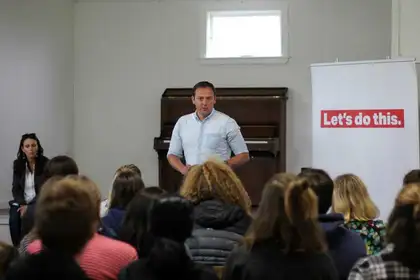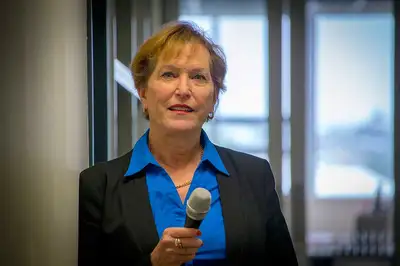
Labour secretary-general Andrew Kirton speaking at the Young Labour's summer camp.
By Dr Catherine Strong
Thank goodness there were three teens sexually abused at the Young Labour camp…not just one. If it was only one 16-year-old girl there would be scant focus on the unfortunate incident, in fact it would probably have been dismissed with comments about what she wore, why she stayed in the room, whether she had a sip of alcohol, and so on.
It’s a sad fact that when a female reveals she has been molested or attacked, or even raped, people find reasons to disbelieve it. True, it is a hard thing to believe, but it happens every day in New Zealand.
The other hard fact is that very few sexual attacks are prosecuted by the police. Women may make a police complaint, but it doesn’t get much farther. Police are hampered by the 2013 Solicitor-General’s Prosecution Guidelines that tells police to have unshakable, tangible proof before attempting to take a prosecution. The woman’s testimony or emotional scarring is not good enough.
Attacks like this are not usually committed with witnesses or smartphone photos to show in a courtroom. The opportunist attacker works in vulnerable locations. So it is easy for a man to escape any repercussions.
If any reader doesn’t get sarcasm, be assured that I don’t really laud that three teens were abused at the weekend camp. It is a horrifying, emotionally-frazzling event for anyone. Unfortunately, thousands of women in New Zealand know exactly what I am talking about.

Senior journalism lecturer Dr Catherine Strong.
Media publicity as a tool for social justice
The Young Labour camp incident is still playing out in the news, as more information comes to light, but basically four 16-year-olds were at a political party weekend. On the surface it is laudable that such young Kiwis are interested and involved in national politics. Note that the title of the weekend was “Young” so they should have easily fit in.
But, as evidenced by a smartphone video doing the rounds of social media, some of it was a rather drunken, raucous event. Perhaps someone was emulating the American politician who used to host booze filled parties, brags about cramming his hand down women’s pants, and ended up getting elected as United States President. I shudder to admit that role-modelling runs deep.
But back to New Zealand where one of the 16-year-olds took the politically astute step of contacting the well-placed Labour Cabinet member Megan Woods to report the incident.
That is when there was finally some action to indicate to the teens that this was not acceptable. Media publicity was the other tool of social justice. Wide publicity and screeds of public comment on the incident over the past few days gave power to the voice that says teens shouldn’t feel they are vulnerable every time they leave home. The media has been a great help to focus on everyday problems for teens.
Victims now need the media to give them space
My plea to the media now, however, is to leave the teens alone and don’t try to interview them. Let them work through this unnerving experience in their own time and own way. There are enough other people commenting on the issue in the media, and some are very knowledgeable and helpful. These stories will help others in this situation, or even prevent a repeat incident. When they feel they are ready, then give them media space.
Remember in 2015 when four women MPs stood up and reported their personal experience with sexual attacks and walked out of Parliament’s Debating Chambers? The then-PM John Key dismissed their action as an easy thing to do, saying all victims would like to have a public stand like that. Well there are thousands of women around New Zealand who can refute Key’s assertion and point out they don’t want the spotlight around an unfortunate event and would rather the spotlight be on the perpetrator.
Even the NZ Police say that it often takes women months or years to get the strength to make a complaint to police. It’s not an easy step, it takes time to work out your priorities.
And all of this reminds me of the Labour Party’s 2014 proposal for a new justice system to deal with rape cases. The basic idea was that a complaint would be heard in something like a tribunal where both sides are heard equally. This would differ remarkably from the current system, where the attacked woman is automatically considered the fabricator and has to undergo aggressive accusations by defence lawyers. This new tribunal proposal got the thumbs up from Labour, Greens and various outside justice activists.
Perhaps this Youth Labour Camp will put that idea higher on the agenda.
Dr Catherine Strong journalism studies coordinator at Massey University